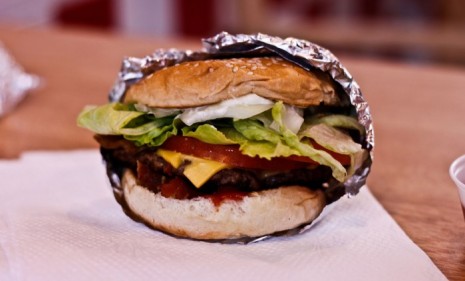The chemical risks in your fast-food wrapper
As if that bacon triple cheeseburger wasn't enough of a health threat, a new study shows that the greaseproof wrapping it comes in might be harming you, too

A free daily email with the biggest news stories of the day – and the best features from TheWeek.com
You are now subscribed
Your newsletter sign-up was successful
Fast food has been widely panned as unwholesome and fattening — now new research suggests that the packaging poses health risks as well. Canadian environmental chemists Scott Mabury and Jessica D'eon report in the journal Environmental Health Perspectives that grease-resistant food wrappers and microwave popcorn bags leach chemicals into food. How worried should drive-thru afficionados be?
What is the chemical leaching into our blood?
The University of Toronto chemists looked at perfluoroalkyls, a family of synthetic chemicals widely used to protect carpet, cardboard packaging, and clothes from oil, grease and water. Specifically, Mabury and D'eon show that when these chemicals are used to greaseproof food wrappers, they migrate into out bodies and break down into a potentially deadly substantance called perflurooctanoic acid (PFOA).
The Week
Escape your echo chamber. Get the facts behind the news, plus analysis from multiple perspectives.

Sign up for The Week's Free Newsletters
From our morning news briefing to a weekly Good News Newsletter, get the best of The Week delivered directly to your inbox.
From our morning news briefing to a weekly Good News Newsletter, get the best of The Week delivered directly to your inbox.
How dangerous is this?
The U.S. Agency for Toxic Substances says PFOA can affect sex hormone and cholesterol levels, and the chemical has caused tumors, delayed development, and early death in lab rats and mice. The larger chemical group, pefluoroalkyls, is also used in fire-fighting foams, notes Rachel Cernansky in Treehugger, and even if PFOA is "a different acid in the same category, how comforting is that?" The compound also stays in your body for years and years.
So, I should stop eating fast food?
Mabury won't go that far. In fact, perfluoroalkyls are very useful, he says, but relying on them to wrap food is not only a preventable risk to our health, it's also "using very expensive and exquisite materials to do a mundane task," when there are lots of other options. Green-living blogger Shane Shirley-Smith will go that far though: Until 2015, when the EPA has ordered chemical companies to phase out PFOAs, she says, you should take this study "as another reason to eat at home and stay away from fast food restaurants and... microwave popcorn."
A free daily email with the biggest news stories of the day – and the best features from TheWeek.com
Sources: Environment News Service, Treehugger, Raw Story, Environmental Booty, AOL Health
-
 The mystery of flight MH370
The mystery of flight MH370The Explainer In 2014, the passenger plane vanished without trace. Twelve years on, a new operation is under way to find the wreckage of the doomed airliner
-
 5 royally funny cartoons about the former prince Andrew’s arrest
5 royally funny cartoons about the former prince Andrew’s arrestCartoons Artists take on falling from grace, kingly manners, and more
-
 The identical twins derailing a French murder trial
The identical twins derailing a French murder trialUnder The Radar Police are unable to tell which suspect’s DNA is on the weapon